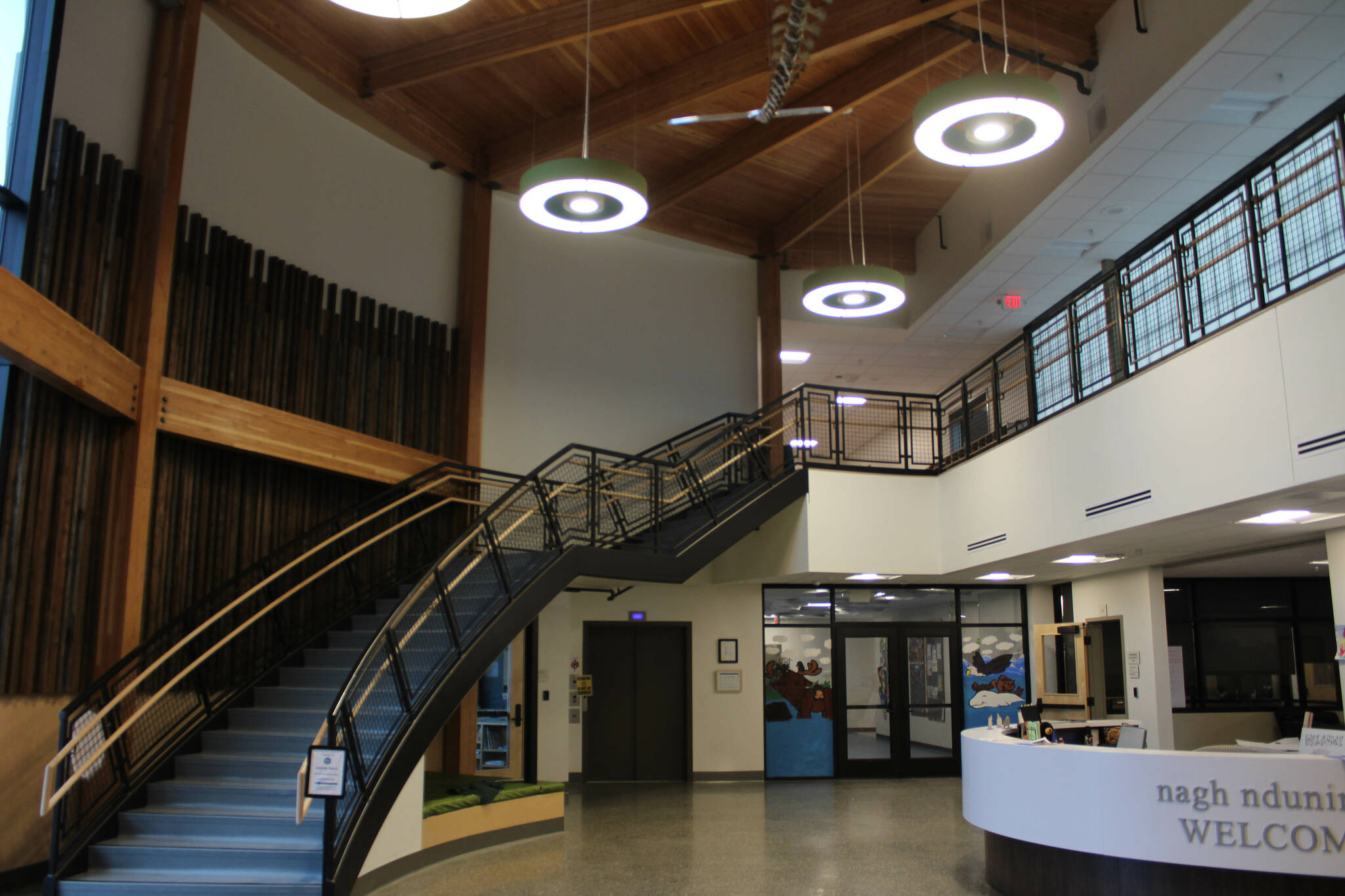Curriculum, logistics and school culture were among the words written at the top of large sheets of paper hung around the Kenaitze Indian Tribe’s Kahtnuht’ana Duhdeldiht Campus last Thursday, where roughly 30 people gathered to share their thoughts about a Dena’ina charter school the tribe is considering starting in Kenai.
The initiative comes as the tribe looks to provide a new school choice for parents and amid heightened legislative interest in Alaska’s charter school system.
The school, if approved, would become the fifth charter school to operate as part of the Kenai Peninsula Borough School District, and would open for the 2025-2026 school year.
Teresa Smith, the tribe’s interim education director, said Thursday that the proposed charter school could accommodate between 40 and 45 students in kindergarten through second grade, and would operate out of the upper level of the Kahtnuht’ana Duhdeldiht Campus. That building currently hosts the tribe’s Head Start and Early Head Start programs, which serve children under 5.
Smith said talks of an education program like the one being considered have been in the works for years. Ahead of Thursday’s meeting, she said some members of the tribal council and of the tribe’s education committee toured different school options around the state and decided a charter school would be the best way to move forward.
“It’s been something that off and on over the years has taken on more of a conversation,” Smith said.
Smith said the tribe already works with families and local elementary schools to help place students who leave the tribe’s existing program.
“We have a strong relationship with all of our elementary feeder schools because we have the long-standing Head Start program,” Smith said. “As those kids age out of us, they need to go into kindergarten.”
One of Thursday’s attendees, Dr. Katie Archer Olson, suggested community and place-based education, developmentally appropriate outdoor play and the incorporation of elders as keepers of wisdom and storytellers as ideas for school curriculum. She is a professor at Alaska Pacific University and ran Learning Tree Montessori for 12 years.
When it comes to pedagogy, which refers to the way something is taught, Olson said there are differences between Indigenous traditions and Western practices, such as the “artificial” learning environment of a classroom. Indigenous children, she said, have been learning for thousands of years in a way that doesn’t adhere to Western norms.
“It’s more holistic in its approach to learning,” she said of the Indigenous approach. “ … Literacy’s important — we have to be able to learn how to read and write in some of these more tradition Western academic skills, but how do we do that in a way that honors our language, our culture, our ways of being and interacting with the society around us?”
Kaylee Gorrod and Chantilly Bayes had similar thoughts. They both have young children and work at the Dena’ina Language Institute, which provides language leadership and Dena’ina teacher preparation. They both said they would be interested in the type of charter school being considered by the tribe.
“They have Kenaitze coming and doing into school outreach with our cultural instructors in the education department, but that doesn’t mean that the pedagogy that they’re using in the schools is supportive to the Indigenous students,” Gorrod said. “Just having a more culturally looked at pedagogy for learning is actually really, really important.”
Consideration of a new charter school comes as the topic receives a lot of attention in Juneau, where lawmakers are considering the best way to financially support Alaska’s public K-12 schools. Gov. Mike Dunleavy has stalled the Legislature’s work until lawmakers also adopt his education priorities, which include allowing more students to access charter schools.
Charter schools are public schools that are overseen by an academic policy committee, which guides principal hiring, curriculum selection and other school decisions. Within KPBSD, prospective charter school petitioners must notify the district of their intent to submit a charter application by Aug. 1 and then submit the application by Oct. 1. The application must be approved by the KPBSD school board and the Alaska State Board of Education.
Kyle McFall, a current KPBSD employee who helped facilitate Thursday’s meeting as a tribal consultant, noted that previous attempts to start charter schools on the Kenai Peninsula have fallen apart after applicants failed to find a facility to host the proposed school. In the case of the Kenaitze Indian Tribe, he said that problem is already solved.
“Half the battle is already won,” McFall told attendees.
Following Thursday’s meeting, Smith said the tribe’s education group will compile the feedback received and use it to build a public survey. As people wrote down suggestions around the room, Smith said she identified suggestions that the tribe already works to incorporate into its educational programming, as well as new ideas.
“This is exactly what we need,” she said. “The commitment, the desire, the interest is there and it gives us a direction, and that’s what we’re looking for. Because, again, we’re here to serve the needs of the community.”
People interested in providing input or feedback regarding a Dena’ina charter school can contact Smith at tsmith@kenaitze.org.
Reach reporter Ashlyn O’Hara at ashlyn.ohara@peninsulaclarion.com.


